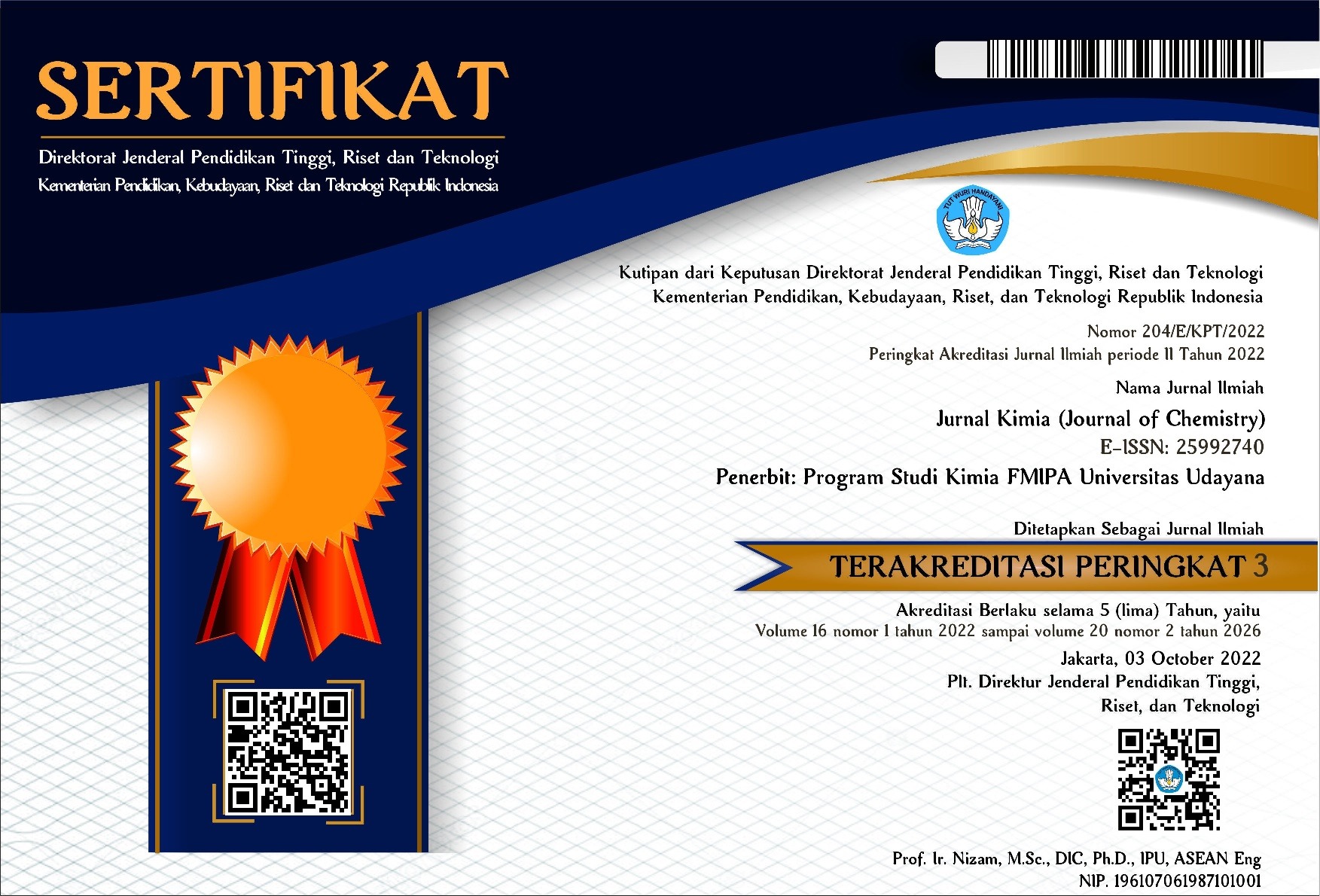EFEKTIVITAS JINTEN HITAM (Nigella sativa) DALAM UPAYA PENYISIHAN BAKTERI Escherichia coli PADA AIR DARI SUMBER MATA AIR DI KECAMATAN SELEMADEG BARAT KABUPATEN TABANAN
Abstract
Telah dilakukan penelitian tentang uji daya hambat ekstrak air jinten hitam (Nigella sativa L.) terhadap penyisihan bakteri Escherichia coli pada air yang terdapat di sumber mata air Desa Tiying Gading Kecamatan Selemadeg Barat Kabupaten Tabanan. Penelitian ini bertujuan untuk mengetahui kemampuan alat penyaring air dengan kombinasi bahan alami (pasir halus, jinten hitam dan karbon aktif), mengetahui kemampuan daya hambat ekstrak air jinten hitam terhadap pertumbuhan bakteri E. coli, serta mengetahui dosis dan waktu kontak optimum ekstrak air jinten hitam dalam menghambat pertumbuhan bakteri E. coli. Metode yang digunakan adalah Plate Count Agar (PCA) dengan media pertumbuhan Cromocult Coliform agar (CCA). Didapatkan hasil bahwa ekstrak dan residu jinten hitam mampu menyisihkan berturut-turut sebesar 99,995% dan 88,095%, dengan dosis optimum 15 mL ekstrak jinten hitam pada waktu kontak 5 menit dan 15 mg residu jinten hitam pada waktu 10 menit. Laju kematian bakteri Escherichia coli tertinggi adalah 1,722/menit untuk ekstrak jinten hitam dan 1,423/menit pada residu jinten hitam. Ekstrak jinten hitam menunjukkan hasil yang lebih unggul dibandingkan dengan residu jinten hitam.
Kata kunci: daya hambat, dosis, Escherichia coli, jinten hitam (Nigella sativa), waktu kontak.
ABSTRACT
Research has been conducted on the inhibition test of black cumin water extract (Nigella sativa L.) against the elimination of Escherichia coli bacteria in water found in the spring of Tiying Gading Village, Selemadeg Barat District, Tabanan Regency. This study aimed to determine the ability of water filters with a combination of natural materials (fine sand, black cumin and activated carbon) and the inhibition ability of black cumin water extract against the growth of E. coli bacteria, as well as the optimum dose and contact time of the black cumin water extract in inhibiting the growth of E. coli bacteria. The method used was Plate Count Agar (PCA) with Cromocult Coliform Agar (CCA) growth media. The results showed that black cumin extract and residue were able to remove 99.995% and 88.095%, respectively, with an optimum dose of 15 mL of black cumin extract at a contact time of 5 minutes, and 15 mg of black cumin residue at a contact time of 10 minutes. The highest death rate of Escherichia coli bacteria was 1.722/min for black cumin extract and 1.423/min for black cumin residue. The black cumin extract showed superior results compared to the black cumin residue. The presence of compounds such as thymoquinone in black cumin extract can increase the ability to eliminate Escherichia coli bacteria.
Keywords: black cumin, contact time, dosage, Escherichia coli, inhibition power, Nigella sativa.
Downloads
References
Dinas Kesehatan Kota Tabanan. 2018. Data Dasar Puskesmas. In Data Dasar Puskesmas.
Hamdiyati, Y. 2011. Pertumbuhan dan Pengendalian mikroba II. Bandung.
Hosseinzadeh, H., Bazzaz, B. & Forounzafar, F. 2014. Black Cumin (Nigella sativa) and its constituent (thymoquinone): a review on antimicrobial effects, Iranian Journal of Basic Medical Sciences, 17(12): 929-938
Lerner, K L., and Lerner, B. W. 2003. World of Microbiology and immunology. Gale.
Luby, S. P., Aeboatwalla, M., Bowen, A., Kenah, E., Sharker, Y., & Hoekstra, R. M. 2009. Difficulties in Maintaining Improved Handwashing Behavior, Karachi, Pakistan. American Journal of Tropical Medicine and Hygiene. 81(1): 140–145.
Novia, A. A., Nadesya, A., Harliyanti, D. J., Ammar, M., Arbaningrum, R. 2019. Alat Pengolahan Air Baku Sederhana Dengan Sistem Filtrasi. Widyakala. 6: 12 – 20.
Okwu, U. M., Odaro S. I. 2020. Comparative Evaluation of The Antibacterial Effectsf Moringa oleifera And Nigella sativa On Some Clinical Bacterial Isolates Obtained from Igbinedion University, Okada, Nigeria. Research Journal of Biology Sciences. 13(2): 20-27.
Vilane, B. R. T. and Dlamini, T. L., 2016. An assessment of groundwater pollution from on-site sanitation in Malkerns, Swaziland. Journal of Agricultural Science and Engineering. 2(2): 11-17.

This work is licensed under a Creative Commons Attribution 4.0 International License





